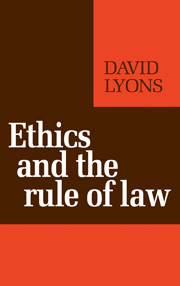4 - Welfare, justice, and distribution
Published online by Cambridge University Press: 19 January 2010
Summary
We now turn from the analysis of law to “normative” jurisprudence – from the nature of law to its evaluation. In this chapter we will examine some general normative theories. We shall begin with utilitarianism, which takes human welfare as its value, and then turn to a theory of justice that challenges utilitarianism.
Although our primary concern is the evaluation of law, these theories have wider implications. A broad perspective seems appropriate because the law provides wide possibilities of deliberate intervention in social arrangements. To the extent that the conditions under which we live are subject to moral appraisal and are susceptible to control by legal action, law is accountable for our fates. The law has indirect as well as direct impact on our lives. We are concerned here with general principles for appraising that impact.
This chapter will serve three purposes. It will explain some moral ideas that have practical and theoretical, contemporary and historical importance. By appraising these ideas, it will complement our discussion of moral judgments and their justification. It will also lay the groundwork for the chapters to follow. Utilitarianism, for example, is an important view about the legal use of coercion and legitimate limitations on personal freedom.
The plausibility of utilitarianism
Utilitarianism is a “normative” theory. In the context of moral philosophy, this does not mean that it claims to describe how decisions are “normally” made, but rather that it lays down a standard for appraising and guiding conduct.
- Type
- Chapter
- Information
- Ethics and the Rule of Law , pp. 110 - 144Publisher: Cambridge University PressPrint publication year: 1983



